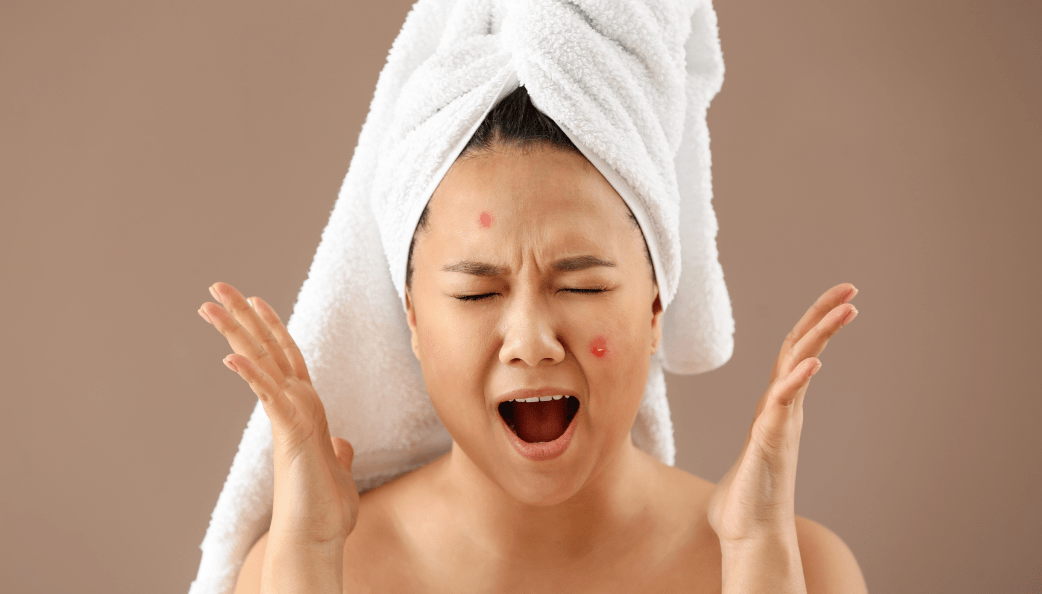
Nov 09 , 2023
What Causes Adult Acne?
In Singapore, 41% of adults are suffering from adult acne. We are no longer teenagers, so why do we still have acne? In fact, it affects almost half of the adult population. The impact of acne extends far beyond blemishes. Individuals with acne frequently experience significant physical and psychological effects, including permanent scarring, poor self-image, depression, and anxiety.
Why do we get acne?
Acne appears when a pore in our skin clogs. Normally, dead skin cells rise to the surface of the pore, and the body sheds the cells. When the body produces too much sebum (the oil that keeps our skin hydrated), the dead skin cells can stick together inside the pore. Instead of rising to the surface, the cells become trapped inside. Bacteria that live on our skin, known as p. acnes, also get inside the clogged pore, which is a perfect environment for bacteria to multiply quickly. The buildup of bacteria in the pore causes it to become inflamed. If the inflammation goes deep into the skin, an acne cyst or nodule may appear.
Signs of acne include blackheads, whiteheads, papules, pustules (aka pimples) and cysts. In teenagers, acne is part-genetic, part-hormonal and largely the result of increased oil production. Adult acne tends to be deeper, more painful and more cyclical. It is usually caused by stress or hormonal fluctuations and is centralized around the mouth, jaw and chin. Because cell turnover slows with age, adult skin can take longer to heal and can be complicated by pigmentation issues.
Causes of adult acne:
- Fluctuating Hormone Levels: Women often experience fluctuating hormones surrounding their periods, during pregnancy, perimenopause, and menopause or after discontinuing (or starting) birth control pills. An imbalance can lead to breakouts.
- Stress: When we’re stressed, our bodies produce more androgens (a type of hormone) that stimulate the oil glands and hair follicles in the skin, which can lead to acne.
- Family History: Studies suggest that some people may have a genetic predisposition for acne.
- Hair And Skin Products: If you have oily or combination skin and are prone to breakouts, you should be using products labeled "oil-free", "non-comedogenic", "non-acnegenic" or "water-based". Cleansing too frequently or too intensely can also be drying, causing your skin to produce more oil to overcompensate.
- Medication Side Effects: Acne is a side effect of some medicines. If you suspect that a medicine is triggering your acne or making it worse, continue taking the medicine — but talk with the doctor who prescribed it.
How to treat adult acne and acne-prone skin?
Treatment for adult acne or acne-prone skin focuses on the 4 main contributing factors – overactive sebaceous glands, cell proliferation, bacteria growth and inflammation.
Look for multifunctional products that include ingredients like salicylic acid and glycolic acid, which exfoliate to help remove surface dead skin cells; benzoyl peroxide, which helps kill bacteria; and soothing botanicals that help soothe skin. Be on the lookout for products that are suitable for oily and acne-prone skin to address the problems.
While not every product works for everyone who has acne or acne-prone skin, virtually every case of acne can be addressed. It takes time and perseverance. Acne treatment doesn’t work overnight. At-home treatment generally requires 4-8 weeks to see improvement and once acne clears, you must continue treatment to prevent future breakouts.


